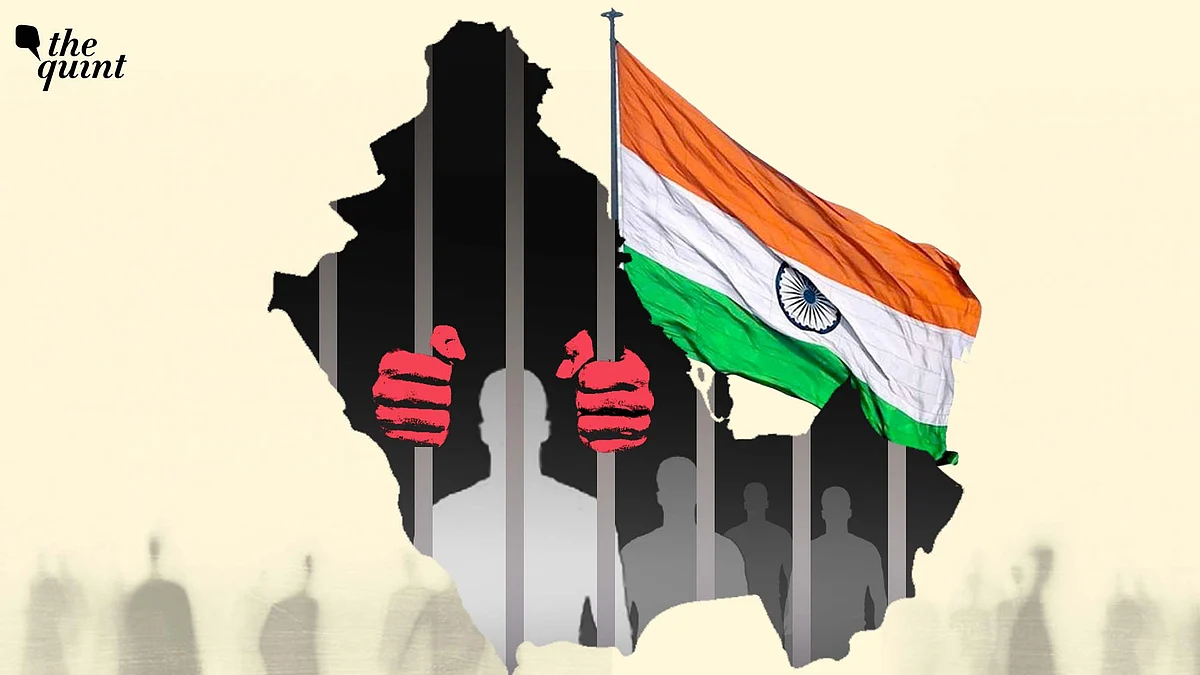
India’s Migrant Crisis: How Many Indian Lives Will be Lost in Gulf Jails?
Over 10,000 Indians are stuck in foreign judicial systems across 86 countries, awaiting trial or serving sentence.

advertisement
Shahzadi Khan, an Indian-origin caregiver, met her end in the United Arab Emirates (UAE) on 15 February 2025, executed by a system that showed no mercy. On 14 February, she made a final, frantic call to her father, her voice trembling as she revealed she was being transferred from a prison to another facility. Sensing the end, her father scrambled in desperation, knocking on every door, pleading for intervention.
But the machinery of fate—or indifference—moved faster. She was gone, her life snuffed out in a foreign land.
The most gut-wrenching twist? Her father wasn’t even granted the dignity of a personal notification. Two weeks later, on 28 February, a sterile text message from an Abu Dhabi number coldly confirmed her execution. This bombshell only surfaced after a petition hit the Delhi High Court on 21 February, forcing the Ministry of External Affairs (MEA) to fess up on 4 March.
Now, pivot to Yemen, where Nimisha Priya, a nurse from Kerala, teeters on the edge of a similar abyss. In 2017, she was convicted and sentenced to death for killing her Yemeni business partner, a ‘crime that she insists was indeed self-defence during a heated clash over their co-owned clinic. Her story—a migrant worker ensnared by a brutal legal code—captured attention, briefly.
Recently, she sent a chilling voice message from Sanaa, Yemen’s war-torn capital, to an Indian social worker: “A lawyer told jail authorities my execution is confirmed.”
Kerala’s news channels blazed with outrage, spotlighting an Indian citizen facing the gallows abroad. Yet, the uproar fizzled, leaving her fate dangling in Yemen’s chaos, with scant diplomatic updates. In both Shahzadi and Nimisha’s cases, the MEA’s response was a disgrace.
Shahzadi’s family was blindsided, unprepared to fight for her life; Nimisha’s kin were allegedly left in the dark as her death sentence loomed. As a migrant rights activist, these failures sear my conscience—they’re not anomalies but symptoms of a rotting system.
A Politically Volatile Crisis
A Lok Sabha document tabled on 28 March 2025, tears open this festering wound: at least 10,152 Indian citizens are entangled in foreign judicial systems across 86 countries, either awaiting trial or serving sentences. The numbers are staggering, but the real outrage lies in their concentration. A meticulous breakdown reveals 6,478—64 percent—languish in the prisons of six Gulf Cooperation Council (GCC) nations: Bahrain, Kuwait, Oman, Qatar, Saudi Arabia, and the UAE.
The GCC hosts 56 percent of India’s global migrant population, millions who toil in its oil fields, build its skyscrapers, and scrub floors. Their sweat fuels economies, yet their lives are disposable.
Don’t let the stats lull you into complacency—this is a politically explosive crisis. First, the GCC’s labour regimes are modern-day slave traps. Low-skilled workers, often from India’s marginalised communities, chase dreams of better lives, only to be shackled by the kafala system—a relic of servitude that chains their legal status to employers with godlike power.
Shahzadi’s execution and Nimisha’s death row are extreme cases, but they reflect a broader pipeline from labour to incarceration. The GCC thrives on our workers, then discards them like refuse when they falter.
Betrayed by Own Nation
Second, and more shameful, is India’s diplomatic betrayal. Where’s the fury? Where’s the ironclad resolve to protect our own? The MEA, tasked with safeguarding citizens, has morphed into a bystander, its silence deafening. Our GCC embassies, awash in resources and platitudes, are failing miserably. Where are the legal aid programs? Where are the relentless negotiations for repatriation or clemency?
In my decade of reporting and activism across the GCC, I’ve seen the rot firsthand. Embassy pro-bono lawyers—the so-called saviours—brush off labour cases with a sneer: “Please, don’t bring us those.”
This misalignment is criminal. The glorified labour lawyers stick to cities, where access is easy, while workers toil in remote camps—industrial wastelands or desert outposts far from urban courts. Labour cases, therefore, drag on, with endless hearings stretching on for years before even a dime of compensation could trickle in—if ever. The fee? A pittance compared to the fast cash of accident claims. That’s how workers are left stranded, defenceless in a system rigged against them.
Moment of Reckoning
This crisis screams for political reckoning and bold action.
First, overhaul our diplomatic playbook. Flood GCC embassies with dedicated migrant welfare units—legal experts, translators, counsellors—to fight for every worker, not just the convenient cases. Equip them to storm courtrooms, secure repatriation, and demand clemency, not twiddle thumbs.
Second, flex India’s economic muscle. The GCC leans on our labour—over nine million strong, sending billions in remittances home. Tie trade pacts to labour rights reforms, forcing these nations to dismantle kafala and end this exploitation racket.
Third, ignite a national firestorm—launch a “Bring Them Home” campaign. Flood the airwaves, fund legal aid, and shame the government into action. Finally, drag the MEA into the dock. Parliament must haul officials before it, grill them on their failures, and mandate quarterly reports on every Indian in foreign jails—names, cases, progress.
The GCC’s prisons are swelling with our people—6,478 souls—and India’s apathy is complicit. Shahzadi’s execution wasn’t a one-off; Nimisha’s limbo isn’t an outlier. This is a systemic disgrace, a test of our sovereignty and humanity. These workers aren’t just numbers—they’re our brothers, sisters, breadwinners, and dreams. We cannot abandon them to foreign gallows and cells. The time for outrage isn’t tomorrow—it’s now. India must rise, roar, and reclaim its own or forever bear the stain of this betrayal.
(Rejimon Kuttappan in a workers’ rights researcher, forced labour investigator and author of Undocumented-Penguin 2021. This is an opinion piece. All views expressed are the author’s own. The Quint neither endorses nor is responsible for them.)
- Access to all paywalled content on site
- Ad-free experience across The Quint
- Early previews of our Special Projects
Published: undefined